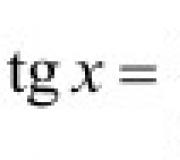Why is early written with two letters n? Spelling of case and gender endings
Н/НН in participles and verbal adjectives
Spelling Н or НН in passive participles is one of those rules that are regularly encountered in dictations, essays and tests.
First of all, remember the rule: In the suffixes of full passive participles, two letters N are written, for example, CUTTED TREES. In the suffixes of short passive participles, one letter N is written, for example, TREES ARE CUTTED.
But since full passive participles are sometimes very similar to adjectives, to avoid mistakes, it is useful to remember the four conditions under which two letters N are written:
1) the participle has a prefix (except NOT-), for example, DRIED MUSHROOMS;
2) the participle was formed from the verb perfect form, for example, SOLVED PROBLEM - from the verb DECIDE (what to do? – perfect form);
3) the participle has dependent words, for example, MUSHROOMS DRIED (where?) IN THE OVEN;
4) The participle is formed from the verb using the suffixes –OVA- or -EVA-, for example, EXCITED FACE.
If a word does not have any of these characteristics, then it is written with one N.
In addition, there are several words with two letters N, the spelling of which must be learned in the same way as we memorize exception words: UNSEEN, UNHEARD, UNEXPECTED, UNGUESSED, ACCIDENTAL, DESIRED, CHEERING, SACRED, CHANDED.
Samples of reasoning
(1) How many N should be written in the participle from the phrase DELETED GARDEN? First of all, you need to see if the participle has a prefix. In our case, there is a prefix, which means that this word must be written with two N: DENIED GARDEN.
(2) How many Ns should be written in the participle from the phrase BROSHEY LOOK? First of all, let's see if the participle has a prefix. In our example, the participle does not have a prefix, therefore, we need to take the next step: determine the type of verb from which this participle was formed. BROSHE__Y was formed from the verb THROW (what to do?) This verb is of the perfect form, which means that in the participle you need to write two letters N: Abandoned LOOK.
(3) How many Ns should be written in the participle from the phrase FISH FRIED IN THE OVEN? The participle in this phrase has dependent words: ROASTING (where?) IN THE OVEN. Therefore, in the participle you need to write two letters N: OVEN FRIED FISH.
(4) How many N should be written in the participle from the phrase ASPHALTED_OE HIGHWAY? Since this participle has the suffix -OVA-, it must contain two letters H: PAVED HIGHWAY.
(5) How many N should be written in the word WEAVE_AYA from the phrase WEAVE_AYA BASKET? Since it has no prefix, no dependent words, no suffixes -OVA- or -EVA-, and also because it is formed from a verb imperfect form WEAVE (what to do?), you need to write one letter H: WICER BASKET.
EXERCISE
“How can I not love him?” she said to herself, delving into his frightened and at the same time joyful gaze.
Levin immediately thought about this, but, despite this, he decided that such views of him from Sviyazhsky were only his unfounded assumption...
(Leo Tolstoy, Anna Karenina)
Well, the guest is uninvited,
Perhaps Father will come in!
I ask you to serve the young lady in love!
They wove scarlet ribbons for her
In two light brown braids,
They brought flowers and clothes
Unseen beauty.
Whoever wants to come to us is welcome;
The door is unlocked for invited and uninvited...
(A. S. Griboyedov, “Woe from Wit”)
Parsley, you are always with new clothes,
With a torn elbow.
(A. S. Griboyedov, “Woe from Wit”)
...Information was requested from the hostile ministry about the measures that had been applied in the last decade...
(Leo Tolstoy, Anna Karenina)
And that consumptive one, your relatives, the enemy of books,
The academic committee that settled...
(A. S. Griboyedov, “Woe from Wit”)
And then she thinks -
God knows why -
That the starry sky is sand
Sprinkled leaf,
Constantly day and night on the road
A wonderfully well-coordinated cart...
(N. A. Nekrasov, “Russian Women”)
Levin always came to Moscow excited, hurried, a little constrained and irritated by this constraint, and for the most part with a completely new, unexpected view of things.
(Leo Tolstoy, Anna Karenina)
No, to this deforested forest
I won't be lured in
Where were the oak trees up to the sky?
And now the stumps are sticking out!
(Nekrasov, “Russian Women”)
He drove to the serf ballet on many wagons
From mothers, fathers of rejected children?!
(A. S. Griboyedov, “Woe from Wit”)
Stepan Arkadyevich had already gone downstairs, undressed, washed again, put on a ruffled nightgown and lay down... (Leo Tolstoy, “Anna Karenina”)
You will come to Nerchinsk if you
The road won't kill you.
Hardly four miles per hour
The chained one is coming...
(N. A. Nekrasov, “Russian Women”)
With a face disfigured by passion, pale and with a shaking lower jaw, Vronsky hit her in the stomach with his heel and again began to pull on the reins...
(Leo Tolstoy, Anna Karenina)
Daria Alexandrovna's eyes ran wild at this elegant, unprecedented crew...
(Leo Tolstoy, Anna Karenina)
Finally married his daughter,
He took a dowry - shish, for his service - nothing.
(A. S. Griboyedov, “Woe from Wit”)
She remembered how she told almost a confession that her husband’s young subordinate made to her in St. Petersburg...
(Leo Tolstoy, Anna Karenina)
At lunchtime they arrived: Alexey Alexandrovich’s old cousin... ...and one young man recommended to Alexey Alexandrovich for the service.
(Leo Tolstoy, Anna Karenina)
To pen from cards? and to cards from the pen?
And what is the proper time for the tides to ebb and flow?
(A. S. Griboyedov, “Woe from Wit”)
I’m running, I won’t look back, I’ll go looking around the world,
Where there is a corner for someone who is offended!..
(A. S. Griboyedov, “Woe from Wit”)
Stepan Arkadyevich... in this comic courtship... and accidentally went so far that he no longer knew how to get back...
(Leo Tolstoy, Anna Karenina)
What are these people called politely?
Tenderer? - he is a secular man,
A notorious swindler, rogue:
Anton Antonich Zagoretsky.
(A. S. Griboyedov, “Woe from Wit”)
Because he softened the angry guest,
I wanted to praise.
(A. S. Griboyedov, “Woe from Wit”)
You sit silently for an hour,
Undepressed, cheerful mind
Meanwhile it works...
(N. A. Nekrasov, “Russian Women”)
Spelling N and NN in different parts speeches
noun
NN
1. Nouns ending in -NIK, -NITSA and OST, formed from adjectives withnn also written withnn : society nn y – society nn IR - society nn itza-society nn awn.
2. Cnn nouns formed using suffixes are also written
-NICK, -NITSA from nouns with a stem onn: tribute - yes nn ik - yes nn itza .
N
1. In nouns formed from an adjective withn , written withn : Yu n y - y n awn.
Remember:
doda n oh, but it's nonsense nn itza
brought up nn IR
chosen nn IR
sacred nn IR
put nn IR
drowned nn IR
brew n IR
smoked n awns
ice cream n oh
muche n IR
harder n IR
study n IR
Adjective
NN
1. In adjectives formed using a suffixn from nouns with a stem onn: kame n b - kame nn oh, with n -so nn oh, ba n I - ba nn y.
Remember:
bar n th
saza n th
tulle n th
This also includes adjectives formed from neuter nouns inme : Name- have nn oh, flame - flame nn oh, tribe - tribe nn Ouch .
Remember:
green n y (but green tent)
blushing n th
svi n Ouch
Yu n y. They are formed without the help of suffixes.
no name nn th
sneakily nn y.
2. In adjectives formed from nouns using the suffixes ENN, ONN:revolution - revolution he N oh, society - societies enne th .
3. In adjectives: tin nn oh, wood nn oh, glass nn y.
4. In adjectives ending in -OVANNYY, -YOVANYY, formed from verbs: take risks –risk nn th , uproot -Korcheva nn y.
Exceptions : kova n oh, chewy n y.
5. In a few adjectives formed from verbs without prefixes or with the negation not (in these adjectives nn are clearly heard ): wish - wished nn oh, no wait - hopeless nn oh, bad luck nn oh, easy nn oh, jama nn oh, sacred nn th .
6. In adjectives formed from verb stems with prefixes:lost nn y (kind), vilified nn y (suit) .
7. Short adjectives are writtennn , if they are formed from full, havingnn : length nn y - long nn a, tse nn y - tse nn ah, celebration nn th - celebration nn s .
8. The first stem of compound adjectives is writtennn , if it is formed from an adjective withnn : wagon nn o-locomotive park (car park nn y and locomotive).
N
1. In prefixless adjectives formed from imperfective verbs (these verbs answer the question what to do ?): rage - rage n oh, cook - cook n y.
Remember: Prefixless adjectives of the type under consideration must be distinguished from similar participles, which are written with nn . Such participles have dependent words:
Heavy n th (adjective) platform – heavier nn aya (participle) stone platform.
2. Adjectives with the suffix IN:chickens in oh, guest in y.
3. Adjectives with the suffix AN, YAN:silver yang oh, hemp yang oh, ice yang Ouch. Exceptions: tin nn oh, glass nn oh, wood nn y.
4. Adjectivewindy. Prefixed adjectives formed from the wordwind , written with nn:no wind nn oh, in the wind nn oh, downwind nn th .
5. In the first stem of complex adjectives, n is written if the first stem is formed from a noun ending in n: wave n construction plant (plant for the construction of vehicles) n ).
It is necessary to distinguish:
wind en good weather - wind yang oh engine
oil en oh damn - oil yang oh cookies
silver yeon second spoon – silver yang this bowl
Sol yeon fish - salt yang oh post
Communions
NN
1. In complete passive past participles formed from verbs with prefixes:With break - break nn oh, By sow - sowing nn th .
Exceptions:
name n y (brother)
I'll plant n y (father)
smarter n y (boy)
2. In full participles formed from perfective verbs without prefixes (these verbs answer the question what to do ?): buy - purchase nn oh, captivate - captivate nn y.
Remember:
unexpectedly nn th
bad luck nn th
unheard of nn th
invisible nn th
affairs nn th
wished nn th
unexpectedly nn th
3. In participles ending in -OVANNY, -YOVANNY:organize ovated .
Remember:
kova n th
chewing n th
smoother n y – re-smooth n th
erased n y - overwashed n th
pisa n oh beauty
Easier n oh sunday
smoother n th
homespinning n th
less traveled n th
4. If the participle has a dependent word:sowing nn Pass flour through a sieve.
N
1. In short participles:hearing n s, story n s, treason n s.
2. If the participle does not have a dependent word, a prefix:scrap n 1st line
Adverbs
NN
1. If nn is written in the suffix of a full adjective or participle, then nn are also preserved in the adverb:scattering nn th man - I look scattered nn oh, scared nn facial expression - frightened nn o calmed down .
Algorithm for working with Н-НН in a word suffix
1. I see a word with N in the suffix before N consonant the letter means, I always write this adjective N (interest Withn y)
2. I see a word with N in the suffix before N vowel letter I carry out word-formation analysis:
3. The word is formed from a noun it means it's an adjective I select the root And I apply the rule(for full and short form):
1) suffix –AN-YAN I write with N(made from something: sand en y)
EXCL: tin Jann y, tree Jann y, glass Jann th
2) suffix –IN-I write with N(always under stress; someone's; from animate noun:
eagle in y)
3) suffix –ENN-ONN I write with NN(morning enne y)
EXCL: wind en th
4) the root (base) ends with N + N suffix - I write NN (tuma nn oh, old man nn y)
4. The word is formed from a verb defining the form
A) full form I apply the rule:
1) there is a dependent word, which means this is a participle – I’m writing NN(crush enne with paint)
2) there is a suffix -OVA-EVA, which means this is a participle - I’m writing NN(rice ovann y)
3) from a perfect verb means this is a participle - I’m writing NN(By crush enne y)
4) from an imperfect verb means this is an adjective - I’m writing N(crush en y gender)
B) short form I define the meaning of the word:
1) direct meaning it means this is a short participle - I’m writing N(children collected en s in class)
2) figurative meaning it means it’s a short adjective – I’m writing NN(children collected Ann s)
COMPLEX CASES OF WRITING N – NN
short form
| EXAMPLES | PARTICIPLES (direct meaning, there may be dependent words, can be replaced with a verb) | ADJECTIVES (figurative meaning, human qualities) combined with the adverb VERY |
| Full form | N | NN |
| 1.Educated | Educated Educated Educated Educated Educated new commission. | Educated Educated Educated Educated She was smart and educated. |
| 2.Organized | The competition is well organized organized. | Organized Students organized, diligent. |
| 3.Excited | Excited Sea excited by the wind. | His speech was moving excited. |
| 4. Absentminded | Scattered There are miracles in the world scattered everywhere. | Absentminded She was inattentive and absent-minded. |
| 5. Well-mannered | Katya was brought up brought up grandmother. | Well-mannered Children are smart and well-mannered. |
| 6. Discreet | Enemy attack contained restrained soldiers. | Restrained Fighters reserved and focused. |
| 7.Focused | Concentrated Troops concentrated in the offensive area. | Focused Students are attentive and focused during the exam. |
| 8.Limited | Limited Brigade limited in time. | Limited neighbor's thinking limited. |
| 9.Exquisite | Exquisite Resources exquisite by the directorate. | Her manners are exquisite exquisite. |
| 10.Depressed | The uprising was suppressed quickly depressed. | People were depressed depressed and sad. |
| 11.Thoughtful | The moves of the game were thought out thought out. | Her behavior is considered thoughtlessly . |
| 12.Confident | Confident Athletes sure in victory. | Confident Movement unsure and awkward. |
| 13.Assembled | There are a lot of potatoes collected in the fields. | The fighters are collected and attentive. |
| 14.Pampered | The grandchildren are spoiled by their grandmother. | Grandchildren are spoiled and rude. |
| 15.Exalted | Exalted by Molchalin exalted in the world. | Sublime Aspirations sublime, clean. |
| 16. Well-read | Lectures read well read professor. | Well-read Friends well read and cultural. |
| 17.Confused | Tangled Traces confused hare | Confused Relationships confused, strange. |
| 18.Exhausted | Exhausted Babes exhausted Expensive. | Exhausted looks from prisoners exhausted And |
| 19.Hounded | Hunted on the hunt hunted fox. | hunted. |
| Hunted down. | 20.Neglected Rocket launched launched | into the space. Alley neglected neglected |
| , undeveloped. | - - - | Soulful Risky Arrogant |
The speeches are heartfelt and sincere.
The trip to the mountains was risky.
| Madame is very arrogant. | ADJECTIVES | ||
| N | NN | remember the spelling | Vocabulary words |
| depend on the value from nouns from verbs 1.windy (excl.) 2.vigorous (excl.) 3.written gorgeous 4.sworn brother (BUT! called by name) 5. Forgiveness Sunday 6. living room - hotel 7. imprisoned father (BUT! A planted tree) 8.dowry brides 9.sister-in-law 10.a complete loser (BUT! Finished business) | 11. sanguine 12. silver 13. twisted guy 14. omshanik ( for bees) 15.smart 16.worker PRIMARY 1. crimson 2. dun 3. black 4. uniform 5. green 6. spicy 7. drunk 8. red 9. ruddy 10. zealous 11. pork 12. blue 13. young POSSESSIVE 1. mutton 2. peacock 3. carp 4. seal 5. pheasant 6. monkey BUT! monkey house 1. slow 2. desired 3. cutesy 4. sacred 5. unexpected 6. unexpected unexpected 7. unseen seen 8. unheard heard 9. unexpected 10. given 11. pecked 12. promised 13. desperate 14. dowry 15. henchman 16. done 17.cursed 18.awake 19.twitchy Human | 20.attorney | |
| in business | 21. teetotaler 22. swagger (swagger = pride) 23. minted (chased = ax) 24. read 25. washed 26. read 27. stirrup 28. home-grown BUT! Washed, washed, read, re-read!! unexpected - unexpected MISTAKES ARE OFTEN: genuine true devotee | ||
| WIND Windy day Windy man No windy BUT! | Wind turbine Chicken pox OIL oily (for oil on oil from oil) oil stain oil paint | ||
| OIL Oiled (stained soaked greased) oily pancake, porridge Oily week – Maslenitsa oily eyes | SALT brine solution | ||
| SALT | salty fish |
SILVER silver ring
SILVER silver copper RESIN resin torch RESIN tar boat ATTENTION!)
Honored e n (from honor it ny) –
Honored e ness.
Udley n e nn th (- length n it – long n A)
1. Suffix -N- is written:
· In adjectives formed from nouns using the suffixes –AN-, -IN-, -YAN-: leather – leather, goose – goose, silver – silver.EXCEPTIONS: wooden, tin, glass.
· In adjectives and participles formed from imperfective verbs that do not have dependent words: forged, loaded, baked, gilded, smoked.EXCEPTIONS:
seen, given, done, desired, cutesy, slow, pecked, sacred, heard, arrogant.
· In adjectives with the prefix NOT-: quicklime, uninvited, uncut, unbleached, unworn. EXCEPTIONS:
unexpected, unforeseen, unheard of, unseen, unexpected, unseen.
· In short forms of participles passive voice past tense: sown, filled, set, excited.
· In short adjectives and in adverbs formed from full adjectives with -H-: confused - confused, mad - furiously, gilded - gilded, ruddy - rouge, young - yuna.
· In adjectives related to non-derivatives: crimson, green, blue, ruddy, young, and also in some other adjectives: mutton, single, pork, smart.
2. Suffix -NN- is written:
· In adjectives formed from nouns ending in -H: long, valuable, captivating, picturesque.
· In adjectives with suffixes -ONN-/-ENN-: propaganda, station, cranberry, straw.
· In adjectives formed from perfective verbs, usually with prefixes or dependent words: frozen, mowed, forged, smoked, purchased, dried in the sun. EXCEPTIONS: named brother, imprisoned father, dowry.
· In adjectives formed from verbs ending in -OVAT/EVAT: uprooted, motivated.
· In adjectives formed from nouns ending in -МЯ: nominal, seed, temporary, parietal.
· In short adjectives and adverbs formed from full adjectives with -НН-: inspired, excited, educated(those. literate).
NOTE:
1. In some cases, the spelling of adjectives with -Н- or -НН- is determined by the semantics of the word.
wind have:
suffix -YAN- if they define an object powered by wind ( windmill);
the suffix -EN- if they define an object containing wind (windy day, windy girl);
suffix -ENH- in all prefixes (windless, leeward, weathered).
Adjectives from the generating stem oil have:
the suffix -YAN- if they define something that is cooked in oil, or something that runs on oil (oil paint, oil pump);
suffix -EN- if they define something that is specially spread with butter (butter pancakes, butter cakes, hence Maslenitsa, this also includes the metaphorical epithet buttered eyes);
suffix -ENN- in participles and adjectives with dependent words (hands oiled with cream, oily sweatshirt).
2. It is necessary to distinguish between the forms of a short adjective and a short participle in the function of a predicate: the girl is brought up - the girl was raised by her grandmother; the woman is educated – the department was founded last year; the group is organized in all matters - the conference is organized by the department.
Questions for control:
Assignments on the topic:
Exercise 1. Educate verb forms, in the suffixes of which the vowel infinitive is retained.
Depend, fold, knead, stir, deflate, roll out.
Task 2. Explain how the words in pairs differ. Using reference material, explain their spelling.
To decorate - to paint, to be late - to participate, to count - to advise, to manage - to admonish, to confess - to educate, to dance - to hum.
Task 3. Write down, highlighting spellings and grouping words into columns:
1) valid prib. present vr., 2) suffering. prib. present vr., 3) actual. prib. pr. vr., 4) suffer. prib. pr. vr. Explain the spelling of words according to the diagram (see "Reference Material").
creeping, barking, barking, chasing, noticing, noticed, kneaded (in dough) - kneaded (dough), sawing, piercing, struggling, developed, cherished, pumped out (oil from a barrel) - pumped out (from a barrel barrel), provided, hung (in the gallery of paintings), hung (a kilogram of sugar), traveled, well-trodden, fanned, provided, healing, adhesive, glued, enduring, loving, dispelled, traveled, dependent, breathing, watering.
Task 4. Insert the missing letters and justify your choice.
A job corrected by someone, a load dropped, paths cleared; the building is about to be built...but; alarmed...by unpleasant news, crowned with laurels, scattered rays, an unnoticed friend, tangled hare tracks, leaf-strewn alleys of a coastal park, offended by someone... that girl, wasted time; the snow melted unexpectedly, without offending anyone.
Task 5. Insert the missing letters.
Nurtured, kneaded (dough), dropped, noticed, engaged, significant, studied..my, cherished, chalked. ..unpreserved, underweight (grain), underweight (curtains), independent, hated...my, offended...my, justified...my, celebrated, transferred..., shot... (deer), shot... (gun), shot... (traitors), scattered..., dispersed, heard... , creeping, dragging, dragging, lost, crowned.
Task 6. Explain the difference in spelling of words in paired phrases.
The woman is smart and educated. - The commission was formed the other day.
The children were inattentive and absent-minded. - The troops were scattered throughout the forest. He says depressed. “The uprising was suppressed.” The decision was hasty and ill-considered. - The decision has not been thought through by anyone. Sauerkraut- pickled cabbage for the winter. Unmown meadow. - Mowed meadow. Come to a dinner party. - Uninvited guests. sworn brother. - Named after you. Windy day. - Calm day.
Remember:uninvited n oh, name n oh, unseen nn oh, unheard of nn oh, unexpectedly nn oh bad luck nn O
Task 7. Replace the dots with the missing letters. Explain why in some cases we write N, in others - NN.
Bee...honey, wheat...porridge, with condensed...milk, oil...stain; painting, rice:... oil paints; a clay vase, a wooden building, located in a guest...ice, noticeable shortcomings, a rye...field sown, a meadow not yet mown, some sort of ...things hanging...in the wardrobe...about the target...harvest, the girl is very educated...and, far away...draw a broken line, silver and gold... jewelry, a wounded man, a seriously wounded fighter, at dawn.




